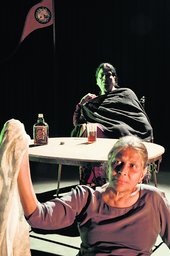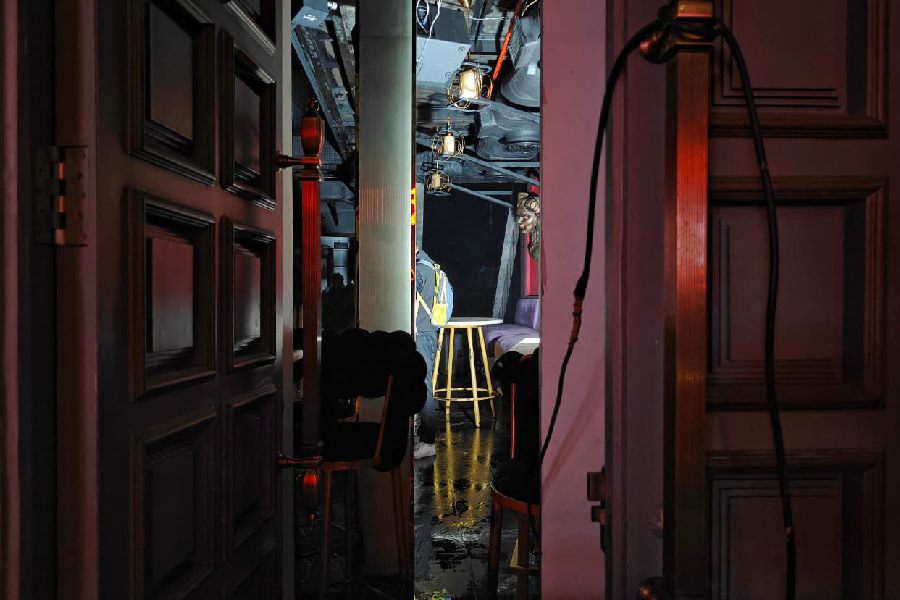 |
| Rangakarmee rehearses for Chehere. Picture by Sanjoy Chattopadhyaya |
Just a year ago when the 2007 film festival was on, a group of young theatre workers were expressing their dismay at the Singur and Nandigram violence on the pavement in front of the Academy of Fine Arts. Candles were lit, songs sung and poetry, prose and plays read. Films were screened on a makeshift screen. A spate of arrests and waiting police vans gave it the look of a war zone.
Cut to November 2008 and a “stage” replete with marble slabs and decorative tiles is coming up under the giant mahogany tree within elbow distance of Harida’s tea stall.
This is being built by the public works department (PWD), especially for outdoor performances that have continued in various forms around the Academy and Nandan.
Several theatre personalities feel that the court order to stop parking in front of the Academy to prevent pollution in the Victoria Memorial Hall area rings the death knell for the Academy’s activities. To them the stage is a deliberate effort to permanently mark the area as a no-parking zone.
“The footfall has and will continue to go down both at the auditorium and exhibition galleries. If people can’t park their cars why should they bother to come? I can’t accept the theory that parking cars within the Rabindra Sadan and Nandan compounds does not cause pollution, but it does if they are parked in front of the Academy. There has been talk of a writ petition but the theatre community has become strangely apathetic,” says stage veteran Rudraprasad Sengupta.
Practitioners of street and angan theatre, however, are pleased. Sunanda Mukherjee, editor of the Rangapat theatre journal, said that her group had pushed the matter with the PWD because “it is only right that an area linked to a cultural hub like the Academy should be used as a platform for little magazines and theatre people.”
District drama
Natyamela 2008, the eighth edition of the annual theatre event organised by Paschim Banga Natya Akademi, will run from November 23 to 30 at various city halls like Rabindra Sadan, Sisir Mancha, Madhusudan Mancha, Girish Mancha and Minerva.
The Nandan-Rabindra Sadan complex this year will be dedicated to the late Ganesh Mukhopadhyay, playwright, director and owner of Rangana Theatre and founder of India’s first make-up firm — Muchem. A run for theatre from Hazra to Rabindra Sadan at 3pm on November 23 will be followed by the inauguration ceremony.
Though there is greater participation from local and district theatre groups, the Rs 16-lakh event doesn’t offer much in terms of novelty.
Among the 95 plays to be staged, most are by Calcutta groups and are already in circulation, like Anya Theatre’s Aachhe Aachhe Sthan, Sundaram’s revival of Alokanandar Putrakanya (with a new cast), Nandikar’s Ajnatobaas, PLT’s Kiratparba and Ensemble’s Sonata.
The only new full-length play is from Nadia, Chandan Sen’s Ghum Ghum Chaand to be performed by Ha-ja-ba-ra-la on November 30 at Girish Mancha. The play deals with the loneliness of a once famous footballer and a “deep, undeniable secret,” said Sen.
Manoj Mitra, on November 28 at Bangla Akademi, will read Bhelai Bhashe Sita, a comment on contemporary realities in the light of various versions of the Ramayana.
“This year we decided to give a chance to groups that have not been a part of Natyamela in the last two years. We have also tried to represent as many districts as possible,” says Champak Baul of the Natya Akademi.
Hindi or Bengali?
Is Rangakarmee a Hindi or Bengali theatre group? In its 33rd year Usha Ganguli isn’t sure.
“I hope we have managed to break all language and cultural barriers. Eighty per cent of my group of 490 members are Bengali, but they speak Hindi fluently and for our next festival in January Rangakarmee actors are working with five local directors on widely different translated scripts from Prem Chand to Joy Goswami,” she laughed.The festival (January 16 to 20) features Burhi Kaki, based on Prem Chand’s story on January 16. Goutam Haldar’s Bengali script, translated into Hindi by Suryakant Tiwari, deals with the miseries that old dependent people like the Kaki (played by Usha Ganguli). Joy Goswami’s short story will take the stage on January 18 at the Academy of Fine Arts, as Katakuti.
On January 19 will be staged Chehere, translated into Hindi by Uma Jhunjhunwala from an American play. This is a “disturbing play about the insecurity and frustration of five lower class women”, says Ganguli. On January 20, Probir Guha presents his brand of open-air theatre with Futa Chasma, a play on young people now, written in Bengali by Guha and translated into Hindi by Surekha Tiwari.











